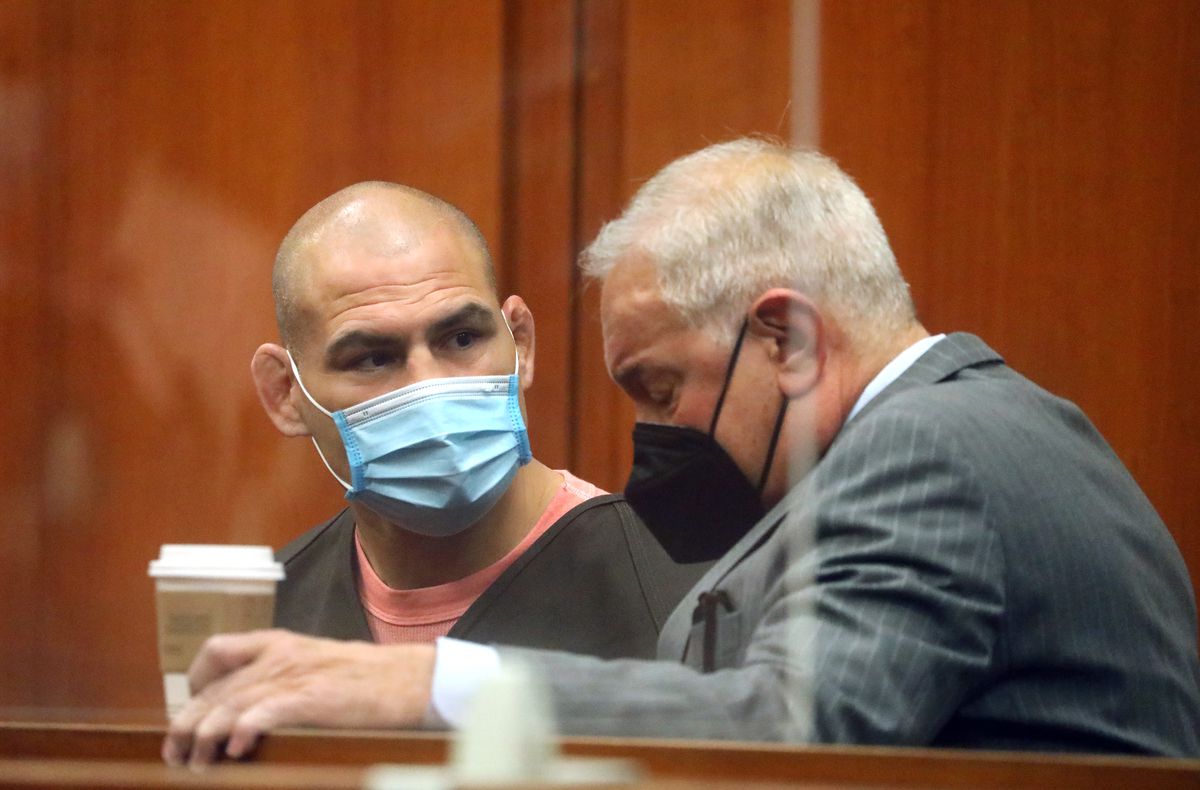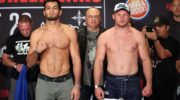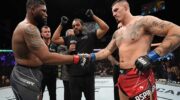Former UFC heavyweight champion Cain Velasquez faces several legal hurdles to avoid significant jail time in his attempted murder case, legal experts say.
Velasquez’s best chance may be to reach a plea deal or, in the case of a trial, press for a hung jury that forces a re-trial, several experts say.
Although many of Velasquez’s supporters point to Velasquez’s intended victim as the cause of the alleged crime, attorneys say the optics of the case — a father taking the law into his own hands after being denied justice — may not matter in a courtroom.
“This is not a complicated case,” veteran defense attorney Steve Cooley told MMA Fighting. “Anyone who says it’s nuanced because his motive was to get even for the [alleged] molestation of someone he loved, that that somehow mitigates it — not really.
“There’s no defense of, ‘I got mad because he really hurt someone I loved.’”
Earlier this month, Velasquez’s plea hearing on a charge of attempted premeditated murder and other gun-related crimes was again delayed. He is accused of engaging in a high-speed chase and then shooting a .40-caliber handgun into the truck carrying Goularte, who’d recently been charged with molesting Velasquez’s close family relative, Goularte’s 63-year-old father-in-law Paul Bender, and Goularte’s mother. During the alleged incident, Bender was wounded twice by the gunfire.
Velasquez remains in jail after a judge this past month denied him bail, calling his case “allegations of extreme recklessness to human life.” The ex-champ has released several statements on social media during his incarceration, showing support for sexual assault survivors organizations and thanking his fans.
Since the circumstances surrounding the alleged incident became public, Velasquez supporters have praised the ex-champ’s actions and criticized the legal system for allowing Goularte to be released on his own recognizance after his initial arrest on a charge of a lewd or lascivious acts with a child under 14.
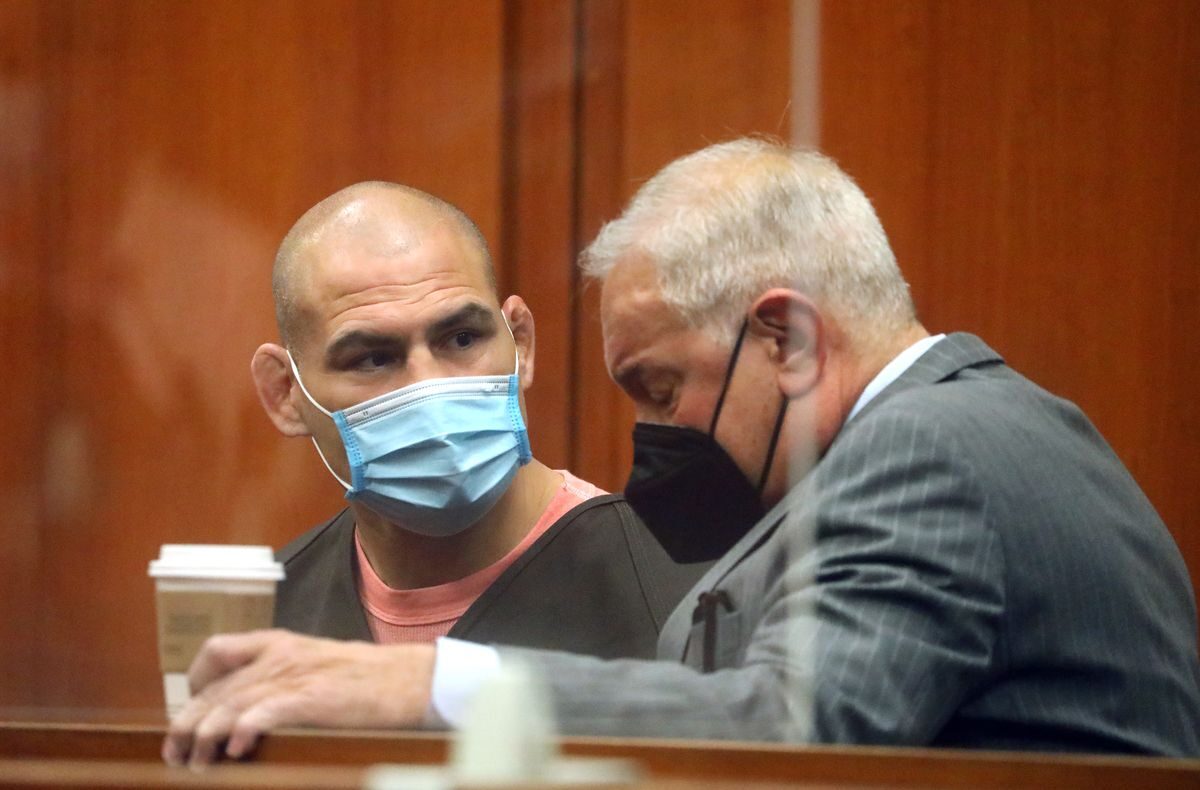
Photo by Aric Crabb/MediaNews Group/East Bay Times via Getty Images
Plea
The biggest task for Velasquez’s attorneys is taking the premeditated murder charge off the table by presenting enough mitigating evidence to cut a plea deal.
“In other words, can you show that this was not premeditated, that this was somehow done impulsively, without deliberating,” said defense attorney Javier Rios. “The first thing you try to do is get him out from under first-degree murder, because first-degree murder carries serious penalties.”
Velasquez faces up to life in prison if convicted of attempted premeditated murder, in addition to a 20-year enhancement for the use of a firearm during the alleged crime.
Medical records were approved this past month for the prosecution and defense, though details of the records were not revealed. Cooley believes the former heavyweight champ should be evaluated by a team of mental health professionals to rule out any immediate illness. Brain trauma from Velasquez’s previous career could also factor into his defense.
“He needs to be mentally evaluated by legitimate medical professionals … because something went wrong with him,” Cooley said.
A common defense in murder cases is to show a defendant didn’t intend to kill a victim and was driven to act irrationally by the circumstances of a situation, possibly making them responsible for a lesser charge such as manslaughter. Velasquez’s defense attorneys are likely to argue Velasquez’s alleged actions came as a response to the alleged crime of Goularte and that Velasquez was, in effect, trying to defend his relative.
Among other things, attorneys will have to explain why Velasquez allegedly acted when he did, several days after Goularte was released from jail, and why the fighter allegedly armed himself.
“In this case that’s tough, because he apparently showed some deliberation,” Rios said. “Getting the tools necessary to try to kill somebody, a prosecutor will typically use those as circumstantial evidence that show that this person has a frame of mind for for first-degree — deliberating what he was trying to do.”
“That does not typically look like someone just impulsively reacting. It sure has the earmarks of somebody that knows what they want to do, gets the tools for what they want to do, and then sets out to do precisely what they intended to do.”
Another complication is the fact that a party that appears unrelated to Goularte’s charge — his father-in-law Bender — was seriously injured during the alleged incident.
“Even if a jury says, ‘We can understand the anger and we can understand how this could lead a normally law-abiding person to react this way,’ there’s really no excuse for him shooting into a car and striking Mr. Bender,” said attorney Alison Triessl.
At the same time, Velasquez’s defense could try to channel anger from the public and use it as a bargaining chip.
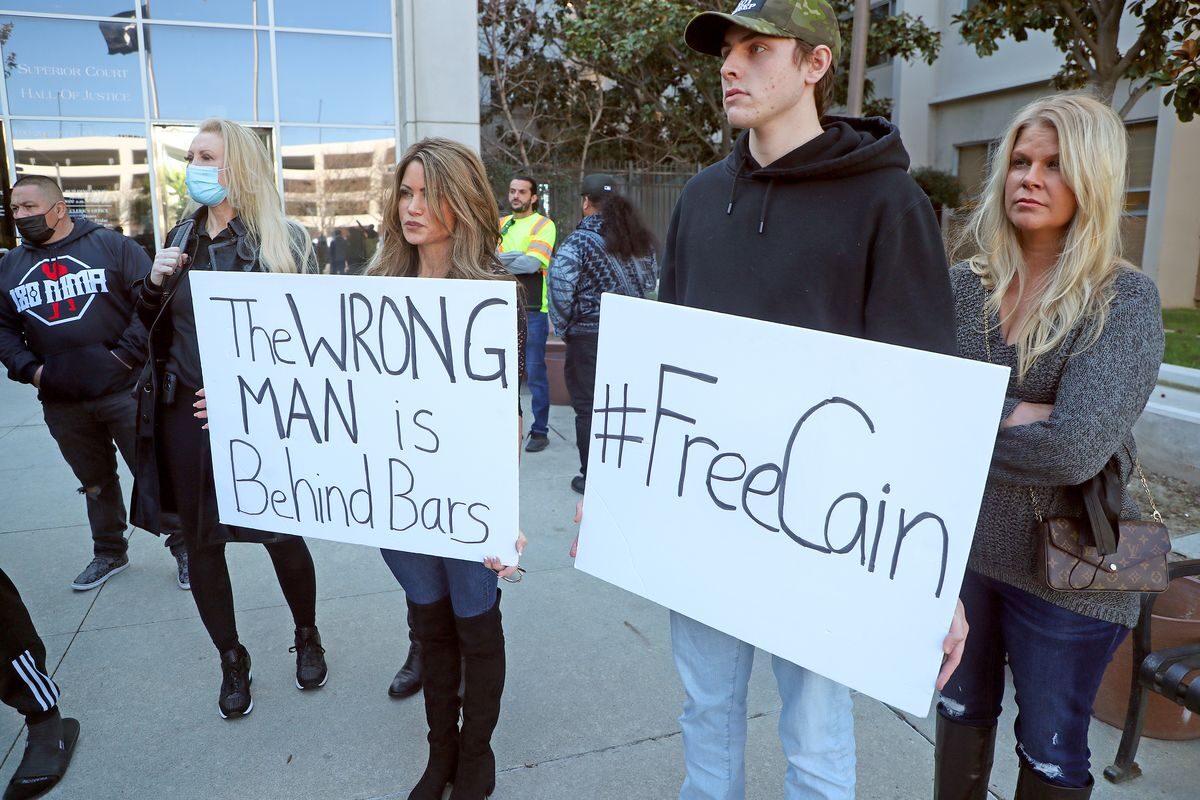
Photo by Aric Crabb/MediaNews Group/East Bay Times via Getty Images
Perception
The hashtag “Free Cain Velasquez” has become popular across the MMA industry, with fighters arguing the ex-champ did what he had to do to protect his family. Several have even showed up at the courtroom. In interviews, they’ve said they would have reacted the same way if they were in Velasquez’s shoes.
Defense attorneys argue that no matter how bad Goularte’s alleged actions look at the moment, he has not been convicted of a crime. (Goularte’s attorney has declared his client is innocent and has been forced into hiding as a result of the charges and the Velasquez case.)
“If the public’s reaction is that the criminal justice system has failed because somebody is fighting their case and they were released, that doesn’t make any sense to me,” Rios said. “When someone is fighting a case, they are presumed innocent. They haven’t been convicted of anything. Zero, zip, nothing. So suppose this guy, the alleged victim, suppose he’s innocent of the child molestation. He’s fighting his case.”
But for Velasquez, the negative publicity toward the California legal system could work in favor of Velasquez by discouraging prosecutors from going to trial. In California, jury verdicts in a murder trial must be unanimous, and the makeup of the jury could present a gamble for the state if they proceed.
“I’m trying to convince one juror — because all you need is one — that it’s understandable what he did given that the criminal justice system failed him, and given this man, he believed he was going to continue to be a danger to children,” Triessl said.
A rare and controversial occurrence is jury nullification, where a juror or jurors essentially decide they disagree with a law and won’t convict a guilty defendant, though if revealed, a judge can have them removed from the court for not making a decision based on whether a law was violated.
“It depends on how much they hear about the intended victim,” Cooley said. “Are they going to hear about the brutal details about alleged molestation? What if he’s found not guilty?”
If a plea bargain fails and the case goes to trial, Cooley said prosecutors could try to keep evidence pertaining to Goularte’s trial out of the picture. The overseeing judge could also rule the issues separate and keep jurors from hearing any information that links the accusations against Velasquez to those of his allegedly intended victim.
“Under some circumstances, he could prevent the bad stuff from being heard because there’s no evidence it happened, more prejudicial than probative, under the circumstances, it doesn’t mount to a defense under the law,” Cooley said. “Therefore, it’s irrelevant. All those circumstances, the judge may say, ‘Not going to hear that today.’”
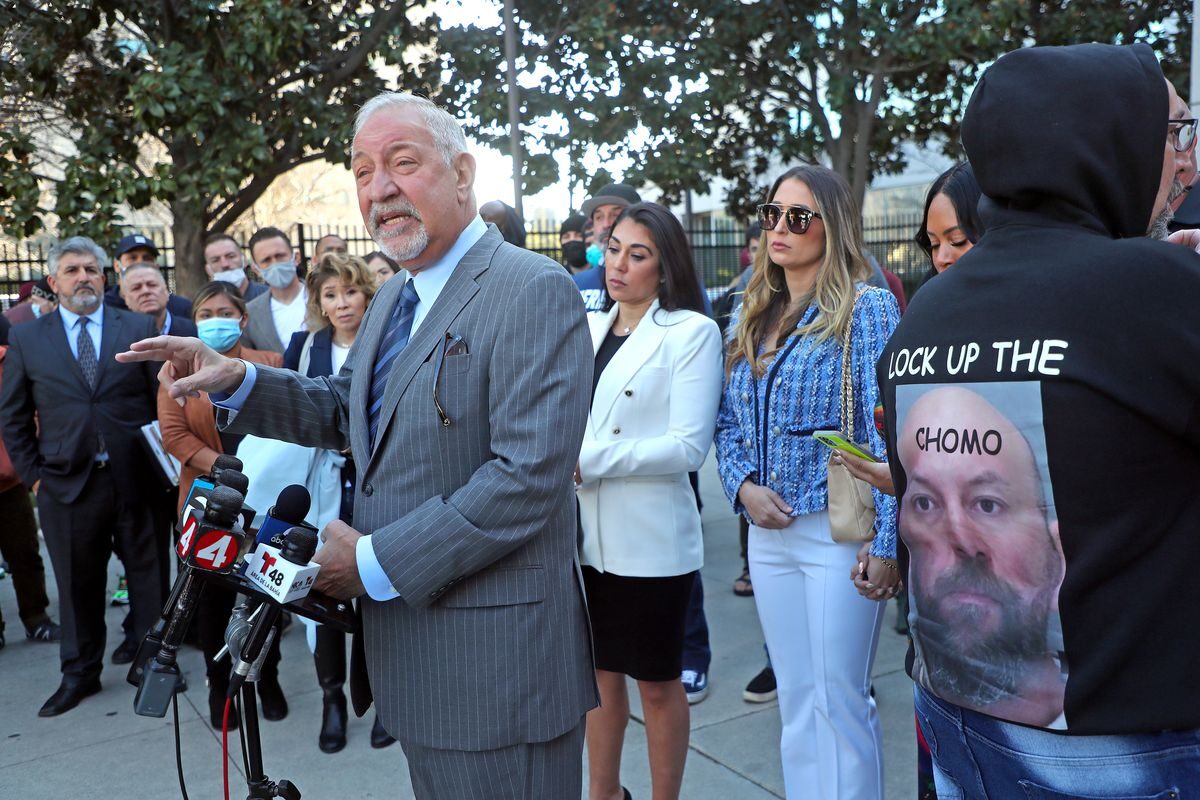
Photo by Aric Crabb/MediaNews Group/East Bay Times via Getty Images
Verdict
Velasquez’s high-profile attorney, Mark Geragos, has litigated dozens of celebrity cases with celebrities such as Winona Ryder, Michael Jackson, Chris Brown, and Colin Kaepernick, many of them with allegations far more salacious, and under a much brighter media microscope.
This time, Geragos and his associates with have to overcome the injuries to Mr. Bender, an alleged high-speed chase through city streets, and the gun used in the alleged crime, among other facts going against Velasquez.
“It’s very difficult to see a complete defense here,” Rios said. “Unless the alleged victim was armed with a weapon and attacked [Velasquez] first or threatened [Velasquez] first, which I have not seen, the case looks more and more where you’re just trying to get the best deal you can.”
The ex-champ arrived in the courtroom this past month with no major charges on his record. He was seen as a role model in the Latino community, a former champion, and was on the brink of restarting his career as a professional wrestler before the alleged incident. He signed “I love you” to his family members in the courtroom and made a heart with his hands.
This past fall, Velasquez opened up about his turn to psychedelics to heal decades of trauma and the loss of his mother and brother in 2019. He said the use of ayahuasca and 5-MeO-DMT not only made him healthier but left him more appreciative of his development as a martial artist and human being.
Velasquez’s character and journey will be on display for the court, but the question is whether its impact will be seen before or after the verdict, when a potential sentence is handed out.
“If you cannot beat the charges, you’re just trying to get mitigation,” Rios said. “Perhaps the fact that the alleged victim, if they can in fact show that he was molesting this loved one from the defendant, arguably that is a mitigator and perhaps that can be used to try and get [Velasquez] a better deal.”
The real point of contention, several prosecutors say, is how much Velasquez will pay for his actions when all is said and done. Legal experts doubt Velasquez will emerge from the case unscathed.
“It’s sad,” Cooley said. “He threw his life away. But you know what, it happens every day. … He threw his life away in a moment of pique, anger, uncontrolled emotion, thinking he could take justice into his own hands.”
